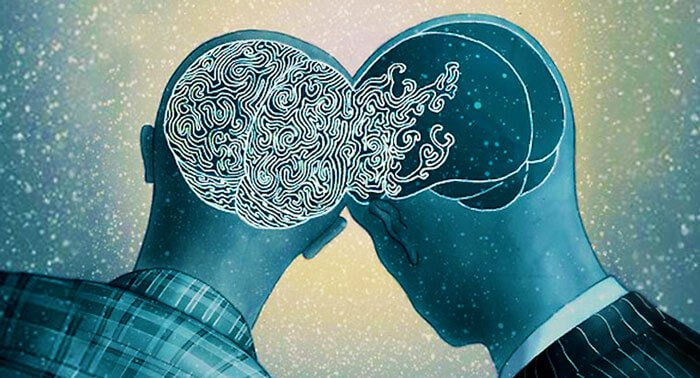A new article, published in the Journal of the Royal Society of Medicine, encourages more empathy in healthcare. The authors address barriers empathic care and also provide recommendations for how to provide ‘empathy-based medicine.’ The authors, led by Jeremy Howick, Director of the Oxford Empathy Programme at the University of Oxford, write:
“The current healthcare paradigm is causing practitioner burnout and sub-optimal patient outcomes. Given that enhanced empathic communication benefits patients, and that it is not being implemented consistently, a change is needed and has been called for.”

Practitioners face many barriers to communicating empathy to their clients, including not having enough time, being overburdened, copious amounts of paperwork, and healthcare settings being target driven. “As a result, patients suffer, claiming clinicians do not communicate adequately, often leaving their needs and concerns insufficiently addressed,” write the authors. They explain:
“Evidence-based medicine has attempted – with variable success – to ensure that new interventions do more good than harm. Yet the focus on evidence has had the unintended consequence that the focus is on tests, treatments and targets while the therapeutic value of the clinical encounter has been lost.”
Research continuously shows that empathic care improves patient outcomes, and therefore the authors state, “empathic care is an evidence-based intervention.” Empathic care helps to reduce pain and anxiety in patients while decreasing stress and burnout in practitioners.
Empathy can be communicated by providers taking the time to talk with patients, offering encouragement, and using verbal signs and physical gestures to communicate interest and understanding. The authors identify three components of empathy in clinical work:
- “attempting, as far as possible, to understand another person’s situation, feelings, and perspective, recognizing the difficulties in putting oneself in another’s shoes;
- communicating that understanding, checking its accuracy; and
- acting on that understanding in a helpful way.”
The authors call for a new paradigm, where “empathic patient/practitioner communication is understood to be an effective intervention in its own right.” In this paradigm shift, patient experiences are valued and care plans are collaborative.
The authors state, “Empathy-based medicine promises to improve patient outcomes, reduce practitioner burnout and save money.” They identify two changes in healthcare that will aid in providing empathy-based medicine.
First, the authors recommend using technology as an asset, rather than a barrier, to empathic communication. This is in line with suggestions from other researchers to use technology to enhance patient care. The authors recommend having the computer screen face both the provider and patient and having medical history data collected electronically prior to a patient’s visit. Technology can also be used to gather patient feedback. They write:
“It is also true that aspects of healthcare delivery can make practitioners less likely to express empathy – time pressure, conflicting priorities, bureaucracy, etc. By re-establishing the clinical encounter as the heart of healthcare, and exploiting available technologies, this can change.”
Second, the authors emphasize that practitioners need to be systemically and institutionally supported in providing empathic care, and therefore a cultural shift needs to occur. They recommend having empathy be modeled by all healthcare staff not only toward patients but between colleagues. They write, “Such a culture would be further supported if healthcare workers were recruited for their desire and ability to empathize, as well as their technical abilities.” The researchers also recommend embedding empathic care into medical training.
The authors aptly note that “practitioners do not usually lack empathy. Instead, they are forced to practice within a system that values targets over people.” Therefore, there needs to be a paradigm shift that supports providers in engaging in empathic care because, ultimately, this will improve the experience of both patients and providers.
****
Howick, J., & Rees, S. (2017). Overthrowing barriers to empathy in healthcare: Empathy in the age of the Internet. Journal of the Royal Society of Medicine. Advance online publication. doi:10.0141076817714443. (Link)















Anyone who has waited in the ER for anxiety attack or anything psychiatric knows the never even bother asking whats wrong, whats going on in your life you are showing up here such a mess ?
Nope, sometimes its a wait and you might spend some time thinking up how you are going to coherently explain it in chronological order so they understand but its not happening, the nurse that takes vitals might be nice and listen but non of that gets addressed then its get in the gown and sit in a room alone for observation. That like fish tank kind of set up they have for psychiatric.
If your lucky you get the ativan, you cloths wallet and freedom and go home, sometimes you might get admitted if your anxiety is really “mania” , then the fun starts.
Very unlikely anyone is going to do much asking about whats wrong.
Report comment
It is quite common to hear persons bemoaning the state of the family and of families in America. Is that just hype and rhetoric? Are American families really “disintegrating” today? Sadly, a lot of evidence seems to indicate that traditional American families are an endangered and disappearing species.
I read something that claimed Veterans PTSD is more about going from being in a tight unit like a family where everyone always has your back to back home to quite the opposite.
I remember the 70s and early 80s family keg parties and holidays everyone managed to get the time off, the ‘corny’ idea that most businesses closed on Sunday was still around. Wasn’t just my family the other kids had a lot of get together events too. School was different too, no surveillance cameras on the bus and the school building wasn’t designed like a prison and of course no drugging for so called ADHD.
I am not an anthropologist but who would have guessed all the advancements in communications , cell phones and Facebook would also lead to more loneliness ?
The opiate and mental health ‘crisis’ is not a result of the usual stuff it gets blamed on at all, we always had drugs and alcohol and ways to get them. Think of the rat park experiment. Plus we did not have mass incarceration, the drug war was just starting and they sucked at it wasn’t till the 90s US really became a police state.
Empathy-Based Medicine, sounds like a good start, things are such a mess, younger people can’t even see it, they have nothing to compare now to besides maybe old TV shows and movies I guess. Things were not TV show perfect back then lots of the same problems but was alot better then now.
How about an Empathy-Based DMV , code enforcement, property tax collectors, justice system and drug war instead of the cut your throat bleed you dry “just doing my job” system we have now ? We can have Empathy-Based everything. Seems like no one wants it.
Report comment
Interesting article. Thank you. Let’s think about this for a minute. Why is there all of a sudden a need for “evidence-based medicine” and “empathy-based medicine”? What might these terms suggest to the thinking individual? At first glance, they suggest that medicine, as is now practiced, is lacking a basis in either evidence or empathy. How can this be? Isn’t medicine the art of healing? What is medicine?
First of all, anyone who knows anything about the history of medicine understands that although it poses as the healer’s art, medicine has been causing harm since its inception. Such is the claim of David Wootton in his book Bad Medicine: Doctors Doing Harm Since Hippocrates. https://www.amazon.com/Bad-Medicine-Doctors-Doing-Hippocrates/dp/0199212791
Second, does anyone else recognize the irony in the attempt to train doctors and medical workers in empathy?
In the 18th century, Jean-Jacques Rousseau argued that medicine is a “lying art,” that is worse than useless. In the 20th century, Thomas Szasz rightly discerned the dangers of the therapeutic state, or the unholy alliance between medicine and politics. In his book “The Theology of Medicine,” Szasz shows that modern medical hegemony – and medical tyranny – is a natural result of man’s propensity to worship the false gods of “science” and “medicine.” Whereas in medieval times laymen were subject to the authority and the erudition of priests, in modern times, patients are subject to the authority and the erudition of doctors. To simplify Szasz’s major thesis, the paradigm of religious authority under priests has been replaced by the paradigm of quasi-religious authority of doctors over patients. Instead of dazzling peasants with Latin phrases and convoluted creeds as did the priests of yore, doctors now dazzle their patients with abstruse medical terminology and jargon. The result is that very few people have thought to question the authority of the new state-sponsored religion of medicine.
Now there is a movement to make the state sponsored religion of medicine more “empathetic” and “evidence-based.” That sounds like a dangerous combination indeed. The paradigm shift that is needed is for “patients” to educate themselves so that they no longer relinquish their liberties and their health to the purveyors of the state sponsored religion of medicine. Only then can empathy flourish.
Report comment
Perhaps we could also have denial-based therapy, collusion-based empathy, and non-existential based decision making. What do you think?
I think that we could expand the healthcare system infinitely — if it hasn’t gotten there already (about which I have my suspicions — if only we created enough hyphenised adjectives to describe it all. We could even soon have raw-based cooking, shrimp-based gigantism, and even, most unbelievable of them all, human-based living. Wow!
Report comment
Yes! Human-based living! That is great! If only we had intelligence-based thinking and truth-based facts, we could have comprehension-based understanding! Thanks Eric. I enjoyed your funny-based humor.
Report comment
A mental health system that is the social service equivalent of run away global warming. Yes, indeed, I think we must be there.
Report comment
Nice word formulation Shannon and I really love your chosen image of two heads coming together to form the ‘symbol’ of a heart. Chosen, I assume, to give an image of empathy as more of a ‘felt-sense’ of reality than a ‘thought’ sense of reality. As a person-centered and viscerally therapist, my own experience of empathy is that, just like love, it hurts.
And I must confess, that there are days when I lack the visceral resources to face the other and their existential pain, preferring, in a self-protective way, to go through the motions of an ‘habituated’ form of well-voiced sympathy. While the ‘academic’ sense of the reality of being a human person, increasingly leaves me bored to tears, and chilled by the lack of visceral honesty, in its postured pretense that the world and humanity, is made of words or names.
While down amongst the dead men, so to speak, where I facilitate a homeless men’s group, I hear a wise street philosopher’s pondering, “do academics dream in words, do you think, as they bake a new formulation, in their efforts to realize a ‘leaven,’ psycho-physiological sense of humanity’s reality?
Report comment
….yada, yada, yada, blah, blah, blah, gobbledyggok-gobbledygook…. profoundly meaningless verbosity….
First I read the comments to this article review, then I read the review itself. Hey, no offense intended to erstwhile medical reporter Shannon Peters, but the original “Royal Society” article is still part of the PROBLEM, not the solution. Condescending arrogance is never empathetic.
I suggest the REAL, TRUE problem, – and SOLUTION, – is much, much simpler.
Currently, we have a process-centered process, and a system-centered system. All profit-driven, of course.
(Calling *ANY* hospital “non-profit” is a cruel joke….)….
What we *NEED*, is a person-centered process, and a services-centered system….
Well….????….
Report comment
Every psychiatrist I’ve had is super cantankerous and bristles if I so much as correct them on a biographical fact about myself, but then believes every damn thing my weird parents says on the phone, fax, behind closed doors. Maddening! There are approximately eighty-sixfold reasons why someone would be in your clinic, it is so easy to, after five seconds of conversation, insert chemical A into neuron B and get out of my damn office. Problem solved.
Report comment
I find this article encouraging, particularly the call for a new paradigm. You can pay someone to write a prescription, or do talk therapy, but you can’t pay someone to care.The most important thing you could give someone is your attention. You dont’ even have to understand them, you just have to care about what they’re saying. Relationships make the best medicine.
Report comment